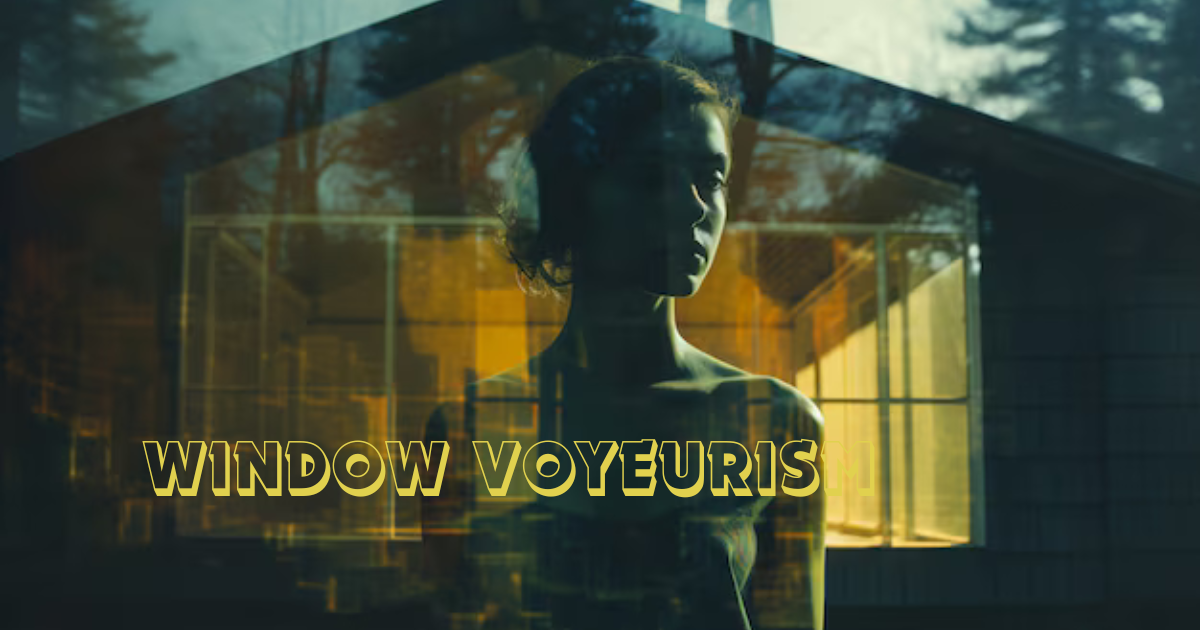The practice of surreptitiously seeing others without their permission, or voyeurism, has long been a source of fascination and worry. Among the several types of voyeurism, “window voyeurism” is particularly notable because it frequently occurs in homes. It entails watching someone via windows without their knowledge or consent, frequently during their most intimate times. This practice presents serious psychological, ethical, and legal issues in addition to invading personal privacy.
This article explores the idea of window voyeurism, the psychological bases of it, the laws that govern it, and defense strategies against these kinds of privacy violations. Finally, we’ll address some commonly asked issues and stress the importance of raising awareness and enforcing the law to stop this intrusive behavior.
What Is Window Voyeurism?
The act of watching or spying on people through windows—often in their houses, where they have a legitimate expectation of privacy—is known as window voyeurism. It usually entails looking through windows at times when people are probably sleeping, undressed, or involved in other private activities. This type of voyeurism can vary from opportunistic, careless peeking to more purposeful, long-term monitoring.
For those who cherish their privacy, window voyeurism is a serious worry since it is frequently motivated by a desire for power, control, or sexual fulfillment.
The Psychology Behind Window Voyeurism
Window voyeurism is one type of voyeurism that frequently results from severe psychological problems. For the voyeur, the excitement of surreptitiously observing others might give them a sense of control or power. In certain instances, it might be connected to underlying sexual abnormalities, in which people enjoy spying on other people without their permission.
The following are typical psychological causes of window voyeurism:
Curiosity: At first, some people may act voyeuristically just out of curiosity. There may be a brief rush from feeling like you’re breaking the law.
Sexual Gratification: If someone watches personal activities or nudity, window voyeurism may arouse their sexual appetite.
Power and Control: Knowing that they are watching others without their knowledge, observers may experience feelings of power or control over the people they are seeing.
Compulsion: In severe situations, voyeurism can turn into a compulsive behavior in which people can’t help but engage in these behaviors.
Legal Implications of Window Voyeurism
In addition to being an unethical invasion of privacy, window voyeurism is prohibited in many places. While there are regional variations in laws pertaining to voyeurism, especially those pertaining to recording equipment, the majority of nations and governments have rigorous prohibitions on the activity.
Criminal Offense: Voyeurism is considered illegal in many jurisdictions, particularly if it entails taking pictures or recordings without permission. For instance, to prevent people from being spied on in their private settings, numerous states in the US have passed specialized anti-voyeurism legislation.
Privacy Laws: It is legally permissible for people to have privacy in their houses. Window voyeurism may be deemed a violation of this right, with potential civil or criminal sanctions for the perpetrator, particularly when it takes place on private property.
Recording Devices: Taking pictures or movies via windows with a camera or other recording device can make the crime more serious. In private settings, secretly filming someone is frequently regarded as a more serious infraction than basic voyeurism.
How to Protect Yourself from Window Voyeurism
Considering the increase in voyeuristic behavior and the accessibility of readily hidden recording equipment, it’s critical to take precautions against window voyeurism. Here are a few doable actions:
Curtains and Blinds: You can keep people from looking into your house by hanging heavy curtains or blinds. Make sure you shut them, particularly at night or when you’re having private conversations.
Frosted or Tinted Windows: You can lessen the likelihood of someone snooping through your windows by using frosted or tinted windows in spaces where privacy is crucial.
Outdoor Lighting: Since spies usually work in the shadows, installing motion-activated lights outside your house can help ward off potential intruders.
Installing security cameras around your property will help you keep an eye out for any unusual activities. Another impediment is the presence of visible cameras.
Report Suspicious Activity: Report any suspicious activity to the authorities right away if you think that someone is watching you via your windows. Providing proof can facilitate law enforcement’s response, such as security camera recordings.
Conclusion
Window voyeurism is a disturbing privacy violation with moral, legal, and psychological ramifications. Although it can seem like a small infraction to others, victims, who frequently feel violated and uncomfortable in their own homes, can suffer greatly as a result. The law takes voyeurism seriously, and individuals who participate risk criminal penalties.
It’s critical to understand the dangers of window voyeurism and to take precautions to keep your privacy and safety. It is possible to protect your personal space from intruders by putting up security measures and reporting any questionable activity. It will continue to be essential to increase public awareness of and strengthen legal protections against voyeurism as society changes and technology becomes more integrated.
FAQs
What is window voyeurism, first off?
Window voyeurism is the practice of secretly watching people via windows, typically in their homes. It usually happens when people expect seclusion, like when they’re getting undress or doing something personal.
Is voyeurism through windows prohibit?
Indeed, voyeurism through windows is prohibit in many places. Although laws prohibiting voyeurism differ from place to place, most of the time it is illegal to spy on someone in their house or to take pictures or films without that person’s permission.
Why would someone go window voyeurising?
Curiosity, sexual arousal, or a need for dominance and control can all be the driving forces behind window voyeurism. Sometimes it can develop into a compulsive activity when people have an overwhelming desire to spy on other people.
What defenses are there against window voyeurism?
You can use tinted or frosted windows, install motion-activated lights, install curtains or blinds, install security cameras, and report any suspicious activity to the authorities to protect yourself from window voyeurism.
How should I proceed if I think someone is watching me online?
If you think someone is watching you via your windows, shut the blinds or drapes and call the police right away. Providing any proof can assist authorities in their investigation and action, such as security camera recordings.









